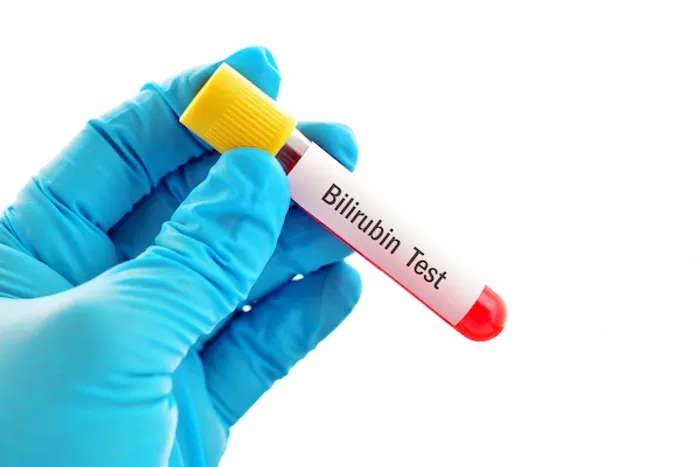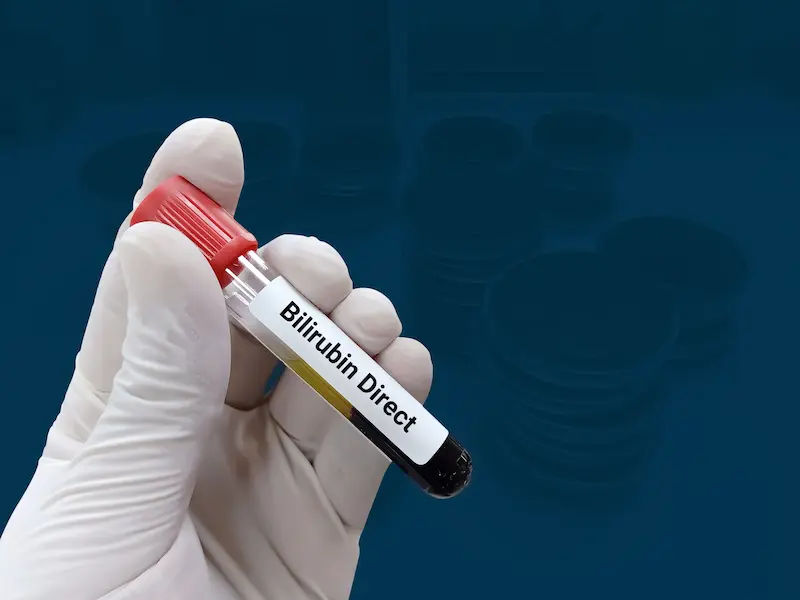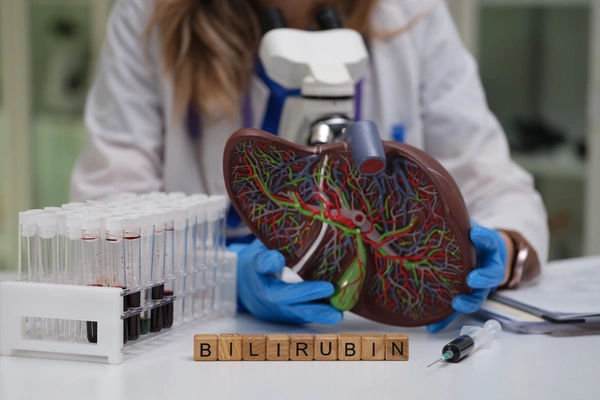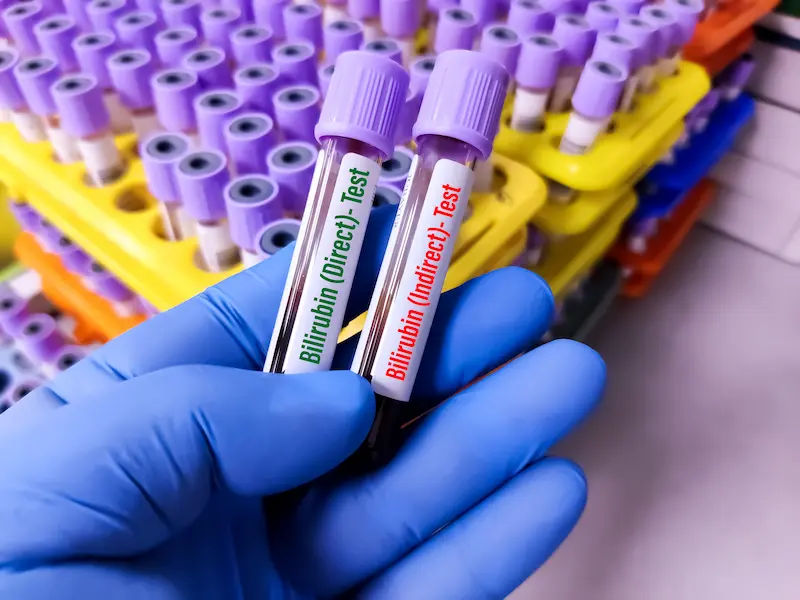Bilirubin Test and Its Normal Range
Understand the bilirubin test, its importance in checking liver function, and learn about normal ranges and what abnormal results may indicate.

Written by Dr. Vasanthasree Nair
Reviewed by Dr. Mohammed Kamran MBBS, FIDM
Last updated on 2nd Sep, 2025

Introduction
When you visit a doctor for a health check-up or if you’re experiencing symptoms like yellowing of the skin (jaundice), you may be asked to take a bilirubin test. This simple blood test helps doctors assess how well your liver is functioning and whether there are any underlying health issues.
If you’re unfamiliar with bilirubin or unsure why this test is important, don’t worry; this article will explain everything in simple terms.
What is Bilirubin?
Bilirubin is a yellowish pigment produced when old red blood cells break down. It’s a natural waste product that your liver processes and removes from your body through bile (a digestive fluid). Normally, bilirubin is excreted in stool, giving it its brown color.
However, if your liver isn’t functioning properly or if there’s an issue with red blood cell breakdown, bilirubin can build up in your blood, leading to jaundice (yellow skin and eyes).
Consult a Gastroenterologist for the best advice
Why is a Bilirubin Test Done?
A bilirubin test helps doctors:
- Check liver function.
- Diagnose conditions like jaundice, hepatitis, or gallstones.
- Monitor newborns for neonatal jaundice (common in babies).
- Detect hemolytic anaemia (a condition where red blood cells are destroyed too quickly).
Get Your Health Assessed
Types of Bilirubin in the Test
There are three types of bilirubin measured in a blood test:
1. Total Bilirubin – The overall amount of bilirubin in your blood.
2. Direct (Conjugated) Bilirubin – Bilirubin processed by the liver.
3. Indirect (Unconjugated) Bilirubin – Bilirubin before liver processing.
By comparing these levels, doctors can determine whether the issue is with the liver, bile ducts, or red blood cells.
Normal Bilirubin Levels
The normal range for bilirubin varies slightly between labs, but generally:
For newborns, higher levels are common due to immature liver function. Pediatricians monitor this closely to prevent complications.
What Causes High Bilirubin?
If your bilirubin levels are above normal, it could indicate:
1. Liver Problems
- Hepatitis (liver inflammation due to infection or alcohol).
- Cirrhosis (scarring of the liver).
- Gilbert’s syndrome (a harmless genetic condition causing mild jaundice).
2. Blocked Bile Ducts
- Gallstones or tumours blocking bile flow.
3. Excessive Red Blood Cell Breakdown
- Hemolytic anaemia (where red blood cells are destroyed faster than normal).
4. Newborn Jaundice
- Common in babies due to an underdeveloped liver.
Symptoms of High Bilirubin
You might notice:
- Yellow skin or eyes (jaundice).
- Dark-coloured urine.
- Pale or clay-coloured stools.
- Fatigue and weakness.
- Abdominal pain or swelling.
If you experience these symptoms, consult a doctor for further evaluation.
How to Prepare for a Bilirubin Test
Before the bilirubin test, you need to know the following:
- Fasting: Some doctors recommend fasting for 4 hours before the test.
- Medications: Inform your doctor about any medications or supplements you take, as some can affect results.
- Newborns: No special preparation is needed for babies.
How to Lower Bilirubin Levels Naturally
If your bilirubin is slightly elevated due to mild liver stress, these tips may help:
1. Stay Hydrated
- Drink plenty of water to help flush out toxins.
2. Eat a Liver-Friendly Diet
- Include fruits (apples, papaya), vegetables (leafy greens), and whole grains.
- Avoid processed foods, alcohol, and excessive fatty foods.
3. Exercise Regularly
- Helps improve liver function and circulation.
4. Get Enough Sleep
- Rest supports liver recovery.
5. Manage Stress
- Chronic stress can affect liver health.
For severe cases, medical treatment (like phototherapy for newborns or medications for liver disease) may be needed.
When to See a Doctor
Consult a doctor if:
- You have persistent jaundice.
- Your urine is very dark or stools are pale.
- You experience unexplained fatigue or abdominal pain.
Early diagnosis can prevent complications, so don’t ignore these signs.
Final Thoughts
A bilirubin test is a simple yet powerful tool to assess liver and blood health. While slightly high levels may not always be serious, persistent jaundice or abnormal results should never be ignored. By maintaining a healthy lifestyle and seeking timely medical advice, you can keep your liver functioning well.
Consult a Gastroenterologist for the best advice
Consult a Gastroenterologist for the best advice

Dr Rohit Sureka
Gastroenterology/gi Medicine Specialist
15 Years • MBBS, DNB General Medicine, DNB Gastroenterology
Jaipur
Apollo 247 virtual - Rajasthan, Jaipur

Dr. Umakanth Eskala
Gastroenterology/gi Medicine Specialist
16 Years • DM (GASTRO)
Visakhapatnam
Apollo 24|7 Clinic - Andhra Pradesh, Visakhapatnam

Dr. Paramesh K N
Gastroenterology/gi Medicine Specialist
16 Years • MBBS, MS ( General Surgery), DNB ( Surgical Gastroenterology)
Hyderabad
Sprint Diagnostics Centre, Hyderabad
Dr. Amitava Dutta
Gastroenterology/gi Medicine Specialist
30 Years • MBBS , MD (General Medicine), DM (Gastroenterology)
Kolkata
Dr Hazra's Clinic, Kolkata

Dr Harish K C
Gastroenterology/gi Medicine Specialist
15 Years • MBBS MD DM MRCP(UK) (SCE-Gastroenterology and Hepatology)
Bangalore
Manipal Hospital, Bangalore
Consult a Gastroenterologist for the best advice

Dr Rohit Sureka
Gastroenterology/gi Medicine Specialist
15 Years • MBBS, DNB General Medicine, DNB Gastroenterology
Jaipur
Apollo 247 virtual - Rajasthan, Jaipur

Dr. Umakanth Eskala
Gastroenterology/gi Medicine Specialist
16 Years • DM (GASTRO)
Visakhapatnam
Apollo 24|7 Clinic - Andhra Pradesh, Visakhapatnam

Dr. Paramesh K N
Gastroenterology/gi Medicine Specialist
16 Years • MBBS, MS ( General Surgery), DNB ( Surgical Gastroenterology)
Hyderabad
Sprint Diagnostics Centre, Hyderabad
Dr. Amitava Dutta
Gastroenterology/gi Medicine Specialist
30 Years • MBBS , MD (General Medicine), DM (Gastroenterology)
Kolkata
Dr Hazra's Clinic, Kolkata

Dr Harish K C
Gastroenterology/gi Medicine Specialist
15 Years • MBBS MD DM MRCP(UK) (SCE-Gastroenterology and Hepatology)
Bangalore
Manipal Hospital, Bangalore



